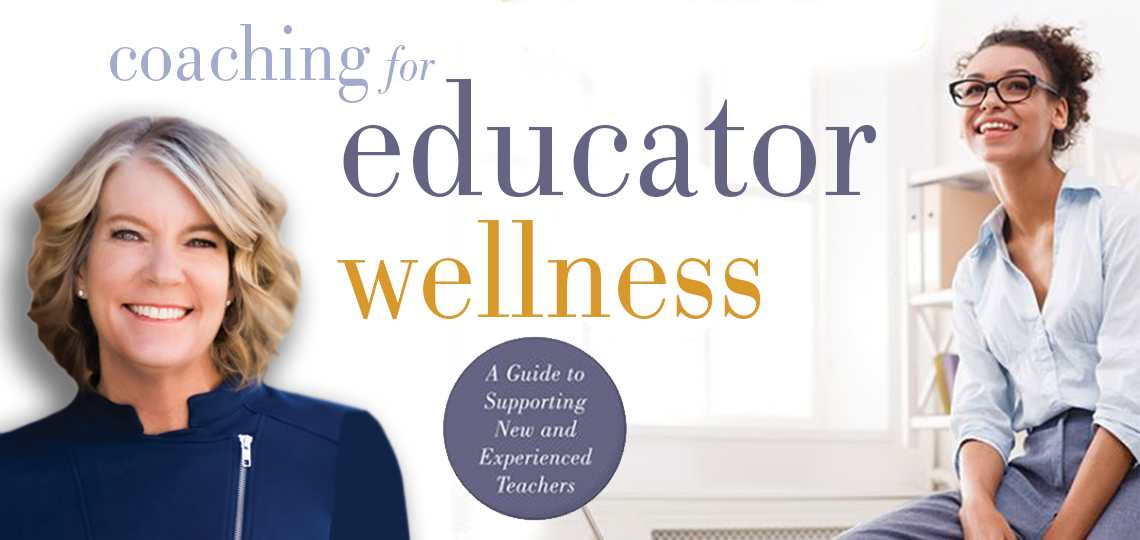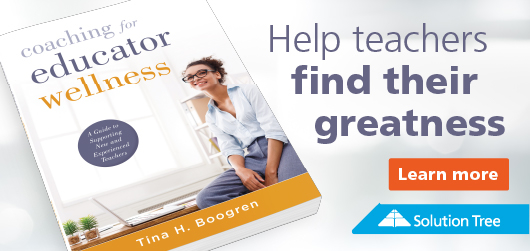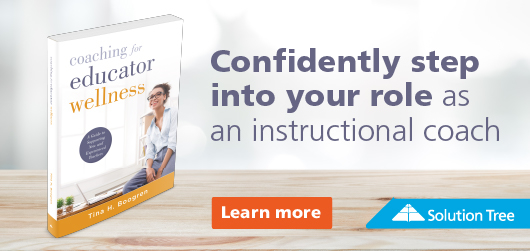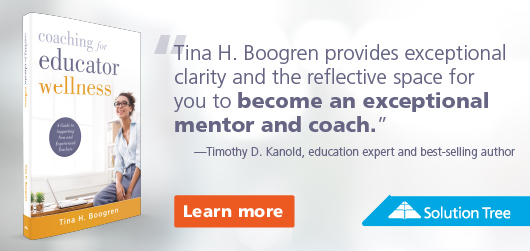A Guide to Supporting New and Experienced Teachers

Who could seriously argue that teachers don’t play a crucial role in any healthy society? And yet, wages for the profession have always lagged behind the pay workers with similar education levels receive in other jobs, and surveys frequently point to the sad fact that teachers don’t feel they receive the support they deserve from school administrators. Teaching is hard work, plain and simple. It’s no surprise that more than forty percent quit within the first five years.
Tina Boogren knows all of this and took it upon herself to offer some solutions in Coaching for Educator Wellness: A Guide to Supporting New and Experienced Teachers. With fond memories of some of our favorite teachers in mind, we asked Foreword’s Executive Editor Matt Sutherland to catch up with Tina for some insight into her innovative ideas.
Please pinpoint the exact reader you had in mind when you wrote Coaching for Educator Wellness? In other words, who is this book for?
This book is primarily for instructional coaches but will also be beneficial for all instructional leaders, including new teacher mentors and school and district leaders looking to increase their coaching skills, particularly those who are new to their positions.
Can you talk about the reasons you see the need for a new definition of wellness amongst professional educators? What are some of the factors that have led to this current state of being unwell?
The demands of teaching are incredible. As any educator knows, this isn’t a 9:00 to 5:00 job and we don’t just simply turn it off when we walk out the school doors at the end of the day. Instead, we think about our students and our lessons all the time. We worry, we fret, we wonder, we grapple—and that takes a toll on us. Recognizing and working to alleviate this toll is an important part of a coach’s role. Just as we work to support the whole child, we should also aim to support the whole educator.
In chapter 1 you encourage readers to both list their own leadership traits and those that they hope to develop, before devising and launching a plan to realize those goals. Do you find that people have accurate opinions about themselves? Do they see themselves honestly or is there commonly some self deprecation or exaggeration?
It’s typically difficult for us to identify our own best leadership qualities—and yet it’s so essential. This is precisely why I ask readers to not skip this step, to not hold back, and to not rush this part. I want them to identify their “it” factor. This may take some time and some support. I encourage readers to ask their ‘squad’ to help and to hear their responses with openness and gratitude.
Goal setting is notoriously difficult but you suggest taking a tiny-steps approach—start with setting that alarm just fifteen minutes earlier, not an hour earlier, when beginning a jogging routine, for example, and just walk around the block for ten minutes that first morning and slowly add a few minutes week by week as it feels right—to keep readers from being intimidated or overwhelmed. Does this approach also work in the professional teaching and coaching environment? What other goal-setting tips do you have up your sleeve?
YES—I’m a huge fan of James Clear’s incredible Atomic Habits, where he pushes us to take the tiny-steps approach. It works; it really, really works! Additionally, I highly recommend tracking your progress and celebrating along the way.
In articulating your why, you write: “I am an author and educational consultant because inspired educators inspire students and inspired students change the world for the better.” And then you cite research showing that people who have a strong sense of purpose are better able to handle stress and stay emotionally balanced. Why do you think this is true? Are whys fairly static or will they change over the course of a career, of a life?
When we’re stressed out and exhausted and have forgotten why we chose this profession in the first place, we’ve got all of the essential ingredients for burnout. If, however, we’re stressed out and exhausted but are still deeply connected to our why (or our purpose), we’re better able to shut out some of the noise and keep going, knowing that we have choices and can take back some control over what’s stressing us out and exhausting us.
You encourage readers to identify their own core values. How do these personal values factor into strong leadership?
When we identify our values—and then live our lives accordingly—we walk our talk and this is an essential trait of leadership. When we know our own essential values, we can ensure that our leadership is congruent with those. Identifying our core values helps to make our “why” for doing this job even more powerful.
For new teachers, the course of their first school year is subject to abrupt, traumatic, deeply challenging—but also predictable, according to Ellen Moir—change. Why is it essential for coaches to be aware of which “phase” a teacher is in?
It is essential for coaches to be aware of what phase a teacher is in so that they can provide support that feels meaningful and relevant. For example, if a teacher is in the throes of disillusionment, this probably isn’t the best time to analyze data with a fine-tooth comb. Similarly, if a teacher is feeling rejuvenated, it’s the perfect time to engage in deep instructional coaching conversations in order to increase the teacher’s expertise with the use of various research-based instructional strategies.
Teachers perform one of the most crucial roles in a healthy society. The job is extremely difficult. From a thirty-thousand feet level, why do you think teachers have never been given their due in this country? Coming out of the COVID-19 debacle, are you optimistic that things may change for the better for teachers, including better training, support, pay, and respect?
I am absolutely optimistic that things may change for the better in terms of recognizing how important it is for educators to take care of themselves so that they can take care of their students. We’re finally learning that there is nothing selfish about self-care; in fact, self-care is essential to our role as educators.
Matt Sutherland



